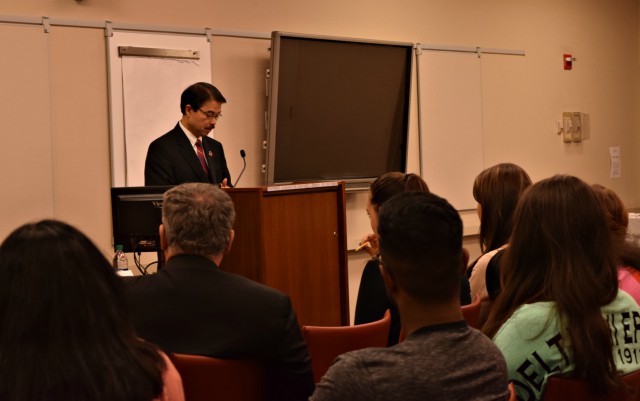On Monday Sept. 26 Ameerah Haq, former United Nations (U.N.) Secretary General for the Department of Field Support came to St. John’s to give a keynote on her 19 years of field experience and overall 39 years of experience working for the UN to promote peace.
The event was co-sponsored by The Women and Gender Studies and Global Development and Social Justice Programs on campus, but was open to all students and faculty.
“It was really evident that Ms Ameerah Haq has seen a lot in her career; she had faced a lot of obstacles and had to work to initiate change, and she has that kind of aura that shows it,” said Sophomore Noah Powers.
“As an anthropology and economics double major, I have a desire for so many diverse topics and experiences of my own, and hearing her speak reminded me that this desire wasn’t so far-fetched,” continued Powers.
The keynote speech was mainly directed towards women in order to enlighten them to work towards career and other goals even if the field is dominated by male figureheads.
Within her position in the United Nations, Mrs. Haq was indirectly paving the way for women that came after her.
She broke her speech up into four parts in order to make the message easier to transcribe.
The first part of her speech was about how over time people have begun to define women’s capabilities and, in that, their limitations.
Mrs. Haq explained that “women hit barriers, they hit legal barriers, cultural barriers, and all the barriers they hit make it harder.”
However, this doesn’t make it impossible.
The fact that the challenges were not impossible led to the last three parts of her speech on how women are now more likely to work within humanitarian, peacemaking and security jobs.
They are taken more seriously and are no longer questioned about their understanding or emotional stability.
After Mrs. Haq’s explanation of the four parts of her speech she also brought up the goals that the U.N. is focusing on for sustainable development, especially for women within it and how they have to have an equal role when decisions are being made.
Women are not filling silent roles, but they are actually there to have an effect.
A change that she was able to see was bringing women into the decision making process and even being able to go into the field locations and lead expeditions.
However, Mrs. Haq brought up an undeniable truth that currently “there is not enough action to make sure women have” the rights that they need to make large changes or take control of higher positions.
In modern times the positions have turned more in women’s favor, but Mrs. Haq had to endure a time before women were being acknowledged as equals in the workplace.
She made sure to bring up the current efforts of the U.N. as well.
She elaborated on details about how they are working with refugees, and the difference between a migrant and a refugee.
She explained that a migrant has the option to stay where they are coming from, but a refugee does not have that option.
The efforts of the U.N. are to always make changes in their process to perform better.














